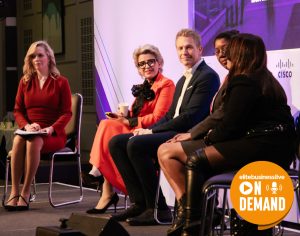Toby McCartney has created more than just a thriving company. From an early age, he felt the need to come up with something that helps the environment and battles the damage his generation has caused. And MacRebur, the plastic road company he launched, is quite the answer. “I don’t want my two daughters growing up in a world where it’s expected there will be more plastics in our oceans than fish,” McCartney says, demonstrating his determination to make a change. Indeed, it’s that commitment and creativity that won his business the approval of Richard Branson at the VOOM 2016 competition from Virgin, which saw MacRebur secure first place.
The idea for MacRebur came about while he was helping a charity working at landfills in Southern India, where people were picking plastic materials to be sold and repurposed into something new. “Some of the waste plastics were put into potholes [and had] petrol poured all over them. The rubbish [was then] set alight until the plastics melted into the craters to form makeshift plastic pothole filler,” McCartney says.
Following that Asian innovation experience he met with two friends, Nick and Gordon, and the trio came up with the final outlook for the idea which is “to take a mix of waste plastics, pelletise them and add them into the making of an enhanced asphalt road.” And so the MacRebur journey began.
But the execution of the project wasn’t as simple as one imagines and it took 18 months of trials before perfecting the final product – MR6. This asphalt binder additive enhances the quality of roads and helps towards reducing the use of fossil fuel. The product “improves strength and durability, whilst reducing the quantity of the oil-based bitumen used in a traditional road mix,” McCartney explains.
MacRebur roads are available all over the UK in the likes of Dumfries and Galloway, Newcastle, Durham, Enfield, Penrith and Cumbria. And when opening new roads, the company is sticking to a proven business strategy. “We have developed a ‘three phase business model’ and have found this to be successful in the UK,” he continues. “And we’re replicating this model around the world,” the CEO shares. Firstly, MacRebur’s products are tested to meet the standards dictated by the road authorities. Secondly, the business asks permission to run live trials and samples undergo further testing. Thirdly, after receiving the permission it employs distributors and begins a marketing and development process.
Such a stringent tried and tested procedure leaves MacRebur in a desirable position for international expansion, which saw the company embark on the launch of its patented plastic roads in the US this summer. “Passing all due diligence and testing, now we have local authorities in San Diego and Lincoln putting roads down with our mixes.” Further recognition was secured just before the start of the new campaign, as MacRebur was awarded the Eco-Excellence Award in the US, winning the Most Innovative title. And just outside of the states, a trial road is also being developed in Canada’s Calgary, which could result in broader distribution.
McCartney admits that choosing the states for the next development stage was justified by the size of the American market and people’s willingness to embrace new approaches. “The US market is 15 times bigger than the UK market and the Americans seem focused on innovation within construction,” he says. “They aren’t simply talking about innovation, they’re actively doing something about it.”
However, given that sheer scaling potential, the US opened a doorway to, the company’s growth in the market required a lot of preparation, some of which the leaders had no past exposure to. “Between our directors, we had no experience of building a business abroad, so we sought advice from UK-based consultants,” McCartney shares. But as the advice received didn’t prove relevant to the countries they had enquiries from – Saudi Arabia, Turkey, Russia and America – the team decided to trust its instincts and rely on the already established relationships with people in the industry. “Rather than follow the perceptions made on a group of people, I believe friendships and therefore good business can be achieved anywhere in the world.”
Having learnt some first-hand entrepreneurial lessons, McCartney opens up about the most important insights he had when exporting. “Once we overcome the cultural differences, learning that people are just people whether you’re in the US or UK, having an open and honest relationship with those you do business with is by far the best way forward for growth,” he declares.
With the initial international foray underway, the next destinations for growth on the company’s list include Asia and Oceania where MacRebur has already started preparations. “We have trial roads made and laid in Bahrain, Australia, New Zealand and Turkey and are working with asphalt manufacturers to test and approve our products in these areas,” he details. “In Australia, we’re working with Greg White, a leading paving expert from the University of Sunshine Coast, who has written a technical paper on our products.”
Looking into the future of the business, the founder is confident that with its environmental impact, new endeavours are just around the corner. One of the areas McCartney points out as a future priority is incorporating recycling plants into the circuit. “It’s important that we use local waste for local roads and need to purchase mobile recycling plants to process local waste for local roads,” he says. The CEO shares that welcoming employees on board is another focus for the foreseeable future. ”We desperately need to employ more members of staff, including sales and technical engineers, to help us take advantage of the many opportunities available to us.”
As innovative businesses are surprising us every day, this eco-friendly company is making a real difference to the way people treat the environment. “Your old rubbish is now making our roads stronger and longer lasting,” McCartney assures. The expression one man’s trash is another man’s treasure has never been more accurate. ![]()
Share via:








































